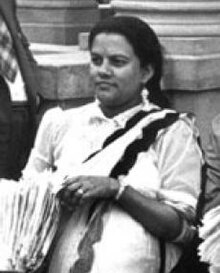
The Defiance Campaign against Unjust Laws was presented by the African National Congress (ANC) at a conference held in Bloemfontein, South Africa in December 1951. The Campaign had roots in events leading up the conference. The demonstrations, taking place in 1952, were the first "large-scale, multi-racial political mobilization against apartheid laws under a common leadership."

Fatima Meer was a South African writer, academic, screenwriter, and prominent anti-apartheid activist.
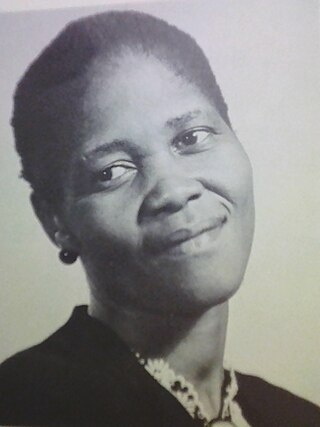
Lilian Masediba Matabane Ngoyi, "Mma Ngoyi", OMSG was a South African anti-apartheid activist. She was the first woman elected to the executive committee of the African National Congress, and helped launch the Federation of South African Women.

National Women's Day is a South African public holiday celebrated annually on 9 August. The day commemorates the 1956 march of approximately 20,000 women to the Union Buildings in Pretoria to petition against the country's pass laws that required South Africans defined as "black" under The Population Registration Act to carry an internal passport, known as a passbook, that served to maintain population segregation, control urbanisation, and manage migrant labour during the apartheid era. The first National Women's Day was celebrated on 9 August 1995. In 2006, a reenactment of the march was staged for its 50th anniversary, with many of the 1956 march veterans.
Sophia Theresa Williams-de Bruyn OMSS is a former South African anti-apartheid activist. She was the first recipient of the Women's Award for exceptional national service. She is the last living leader of the Women's March.
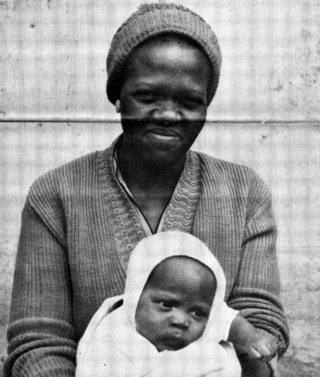
Elizabeth Mafekeng was a South African trade union and political leader who fought against the injustices suffered by the working class and against the racial segregation laws imposed by the apartheid system.
Florence Grace Mkhize was an anti-apartheid activist and women's movement leader. Mkhize was usually called 'Mam Flo'. Mkhize was also involved in trade unions in South Africa, organizing for the South African Congress of Trade Unions (SACTU).
Amina Cachalia, OLB was a South African anti-Apartheid activist, women's rights activist, and politician. She was a longtime friend and ally of former President Nelson Mandela. Her late husband was political activist Yusuf Cachalia.
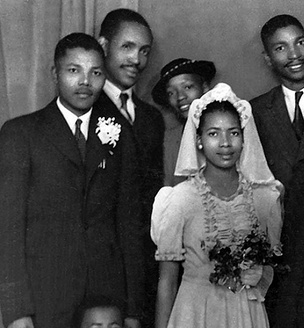
Evelyn Ntoko Mase, later named Evelyn Rakeepile, was the first wife of the South African anti-apartheid activist and the future president Nelson Mandela, to whom she was married from 1944 to 1958. Mase was a nurse by profession.
Emma Mashinini was a South African trade unionist and political leader. Living in Johannesburg, her family was forcibly displaced several times during her childhood. She started working at age 14 and soon became a union organiser at her garment factory. She became active with the African National Congress (ANC) in 1956. Mashinini served for 12 years on the executive board of the National Union of Clothing Workers (NUCW) and founded the South African Commercial, Catering and Allied Workers Union (SACCAWU) in 1975. She was arrested and detained without charges for six months in 1981–82.

Trafalgar High School is a public English medium co-educational secondary school in District Six of Cape Town in South Africa. It was the first school built in Cape Town for coloured and black students. The school took a leading role in protesting against apartheid policies. It celebrated its centenary in 2012 and is still running and was recently declared a heritage site.
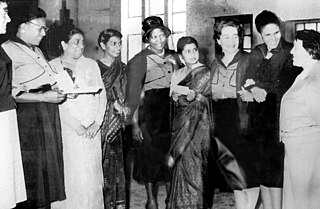
The Federation of South African Women (FEDSAW) was a political lobby group formed in 1954. At FEDSAW's inaugural conference, a Women's Charter was adopted. Its founding was spear-headed by Lillian Ngoyi.
Women's March took place on 9 August 1956 in Pretoria, South Africa. The marchers' aims were to protest the introduction of the Apartheid pass laws for black women in 1952 and the presentation of a petition to the then Prime Minister J.G. Strijdom.
Makwena Lydia Komape-Ngwenya, also known as Lydia Kompe, was a South African politician, activist, and trade unionist. She represented the African National Congress in the National Assembly from 1994 to 2009 and in the Limpopo Provincial Legislature from 2009 to 2019.

Feroza Adam was a South African political activist, a publicist for the African National Congress and other organizations. She was elected to Parliament in 1994, shortly before she died in a car accident.
Letitia Sibeko was a South African anti-apartheid activist. She was member of the African National Congress, the ANC Women's League as well as the Federation of South African Women. She later joined the Communist Party.
Dr. Zainab Asvat was a South African anti-apartheid activist. Asvat was trained as a medical doctor, but was politically active most of her life.
Rahima Moosa Mother and Child Hospital is a maternity hospital in Coronationville, Johannesburg, South Africa. Prior to 2008, it was known as the Coronation Hospital.
Lilian Diedericks OLS was a South African activist known as a founding member of the Federation of South African Women.
Amina PahadOLS was a South African anti-apartheid activist. A member of the Transvaal Indian Congress, she rose to prominence for her role in passive resistance against the Asiatic Land Tenure and Indian Representation Act of 1946. She was also known as the matriarch of the Pahad family's politically active home in Johannesburg.
